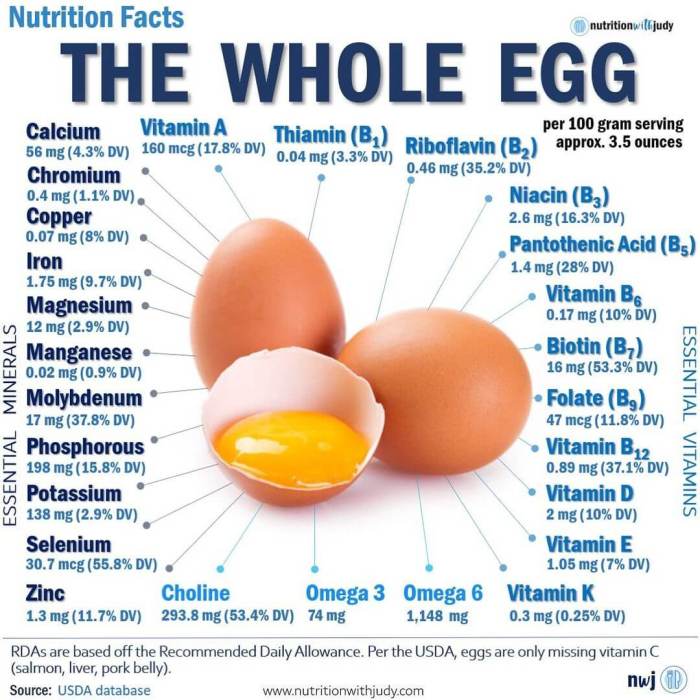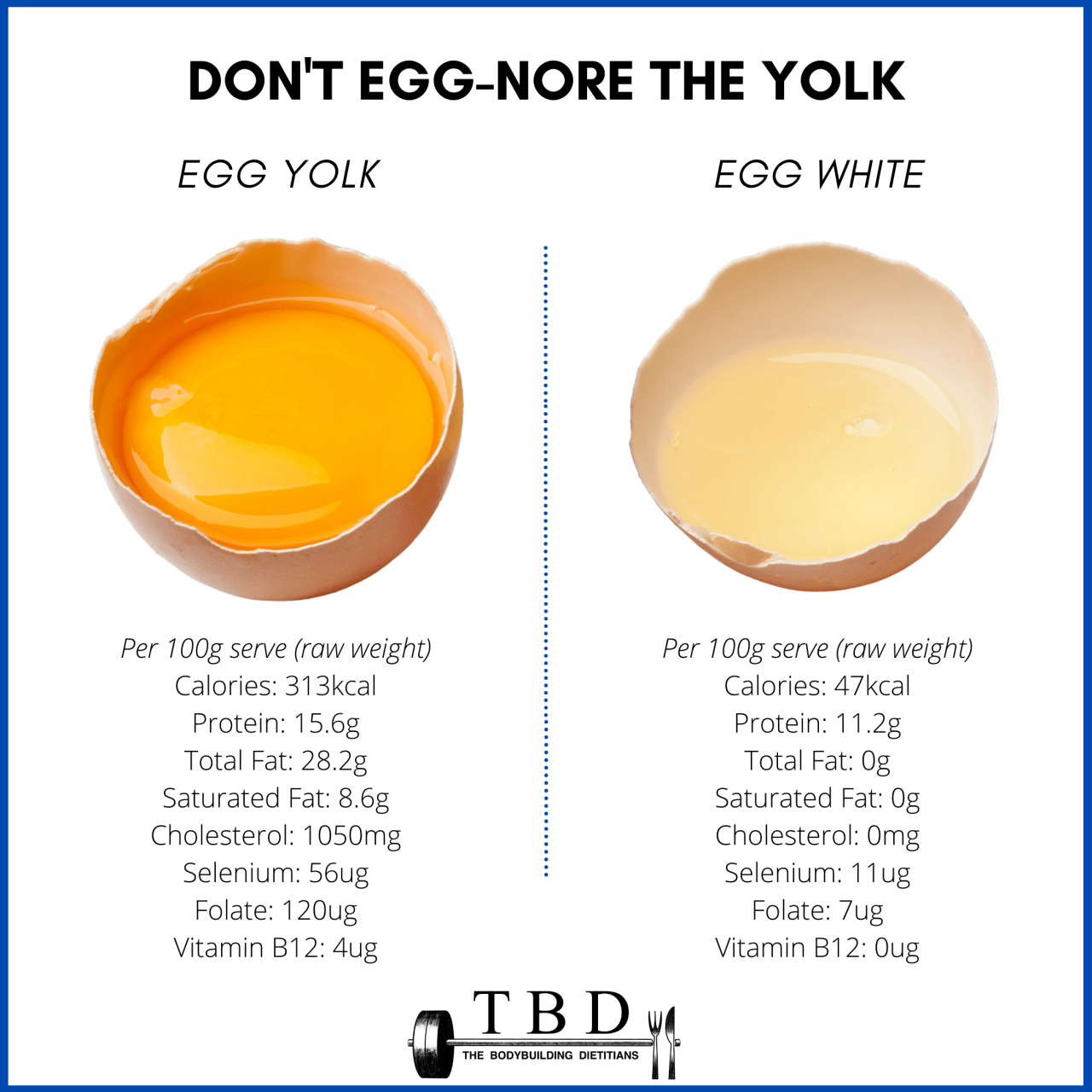Egg Yolk Macronutrient Profile: Egg Yolk Nutrition Facts

Egg yolk nutrition facts – The humble egg yolk, often overlooked in favor of the egg white, is a nutritional powerhouse packed with essential macronutrients and micronutrients. Understanding its macronutrient profile—the balance of protein, fat, and carbohydrates—is crucial to appreciating its role in a balanced diet. This section details the macronutrient composition of a single large egg yolk and explores the implications of its unique fat profile.
Macronutrient Breakdown of a Large Egg Yolk
The following table provides a detailed breakdown of the macronutrients found in a single large egg yolk (approximately 17 grams). Note that values may vary slightly depending on factors like hen breed and diet.
| Nutrient | Amount (grams) | Percentage of Daily Value (approx.)* | Notes |
|---|---|---|---|
| Protein | 3.6 | 7% | Provides essential amino acids crucial for building and repairing tissues. |
| Fat | 5.3 | 8% | Contains a mixture of saturated, monounsaturated, and polyunsaturated fats. |
| Carbohydrates | 0.6 | <1% | Primarily in the form of trace sugars. |
*Percentage of Daily Value is based on a 2000-calorie diet and may vary depending on individual needs.
Egg Yolk Fat Profile and Health Implications
Egg yolks are rich in fats, and understanding the types of fats present is essential for assessing their impact on health. Egg yolks contain a mixture of saturated, monounsaturated, and polyunsaturated fats, including omega-3 and omega-6 fatty acids. While saturated fat has been linked to increased cholesterol levels in some studies, egg yolks also contain cholesterol. The relationship between dietary cholesterol and blood cholesterol is complex and not fully understood.
Egg yolks are nutritional powerhouses, boasting high levels of choline and healthy fats. However, their calorie density contrasts sharply with the sugar content found in many energy drinks; for example, understanding the red bull nutrition facts helps illustrate this difference. Returning to egg yolks, their rich vitamin and mineral profile makes them a valuable part of a balanced diet, despite the higher calorie count compared to egg whites.
Current dietary guidelines generally recommend limiting saturated fat intake, but moderate consumption of whole eggs, including the yolk, is often considered part of a healthy diet for many individuals. The impact of egg yolk consumption on blood cholesterol levels varies significantly depending on individual factors like genetics and overall diet.
Protein Content Comparison
Egg yolk protein, while less abundant than in the egg white, still offers a valuable source of essential amino acids. Compared to other common protein sources, egg yolk protein provides a good balance of amino acids, though the overall quantity is lower than that found in lean meats like chicken breast or fish. For instance, a 100g serving of chicken breast contains approximately 30g of protein, significantly more than a single egg yolk.
However, the protein quality of egg yolk is high, making it a valuable component of a varied diet. Consider that the overall nutritional profile of an egg yolk offers much more than just protein; its fat and micronutrient content are equally important considerations.
Egg Yolk Allergies and Intolerances

Egg yolk allergies and intolerances, while both causing adverse reactions after consuming egg yolks, differ significantly in their underlying mechanisms and severity. Understanding these differences is crucial for effective management and avoidance strategies. Both conditions can range from mild discomfort to severe, life-threatening reactions, emphasizing the need for proper diagnosis and personalized dietary approaches.
Symptoms of egg yolk allergies and intolerances can vary widely depending on the individual and the severity of the reaction. Allergic reactions are typically mediated by the immune system, triggering the release of histamine and other inflammatory substances. Intolerances, on the other hand, involve a non-immune system-related mechanism, such as digestive enzyme deficiencies.
Egg Yolk Allergy Symptoms
Egg yolk allergies manifest as a range of symptoms, from mild to severe. Mild symptoms may include hives, itching, or a tingling sensation in the mouth. More severe reactions can involve swelling of the face, lips, or tongue (angioedema), difficulty breathing (bronchospasm), and a drop in blood pressure (anaphylaxis). Anaphylaxis is a life-threatening emergency requiring immediate medical attention. The severity of the reaction isn’t necessarily predictable; a mild reaction one time doesn’t guarantee a mild reaction in the future.
For instance, a person might experience only mild hives after eating a small amount of egg yolk in a cake, but a subsequent exposure, even a smaller amount, could trigger a severe anaphylactic response.
Egg Yolk Intolerance Symptoms
Egg yolk intolerance symptoms are usually less severe than allergic reactions and primarily affect the digestive system. Common symptoms include bloating, gas, diarrhea, stomach cramps, and nausea. These symptoms typically appear within a few hours of consuming egg yolks. The severity of the symptoms is often related to the amount of egg yolk consumed; consuming a smaller quantity might produce only mild discomfort, whereas a larger amount could lead to more significant digestive distress.
For example, a person with an egg yolk intolerance might experience mild bloating after eating one scrambled egg but suffer from significant diarrhea after consuming two.
Distinguishing Egg Yolk Allergy from Intolerance
The key difference lies in the underlying mechanism. Egg yolk allergies are immune-mediated, involving IgE antibodies that trigger a cascade of inflammatory responses. Intolerances, conversely, are non-immune-mediated and often involve digestive issues, such as enzyme deficiencies or sensitivities to specific components of the egg yolk, like proteins or fats. A proper diagnosis requires a thorough medical evaluation, including allergy testing (skin prick test or blood test) to confirm or rule out an allergy.
Dietary Strategies for Egg Yolk Allergies and Intolerances, Egg yolk nutrition facts
The most effective strategy for both conditions is strict avoidance of egg yolks. This requires careful reading of food labels, as egg yolks can be hidden ingredients in many processed foods. For those with egg yolk allergies, accidental exposure can be dangerous, so thorough avoidance is paramount. Individuals with intolerances may have a slightly greater tolerance, but minimizing or eliminating egg yolk intake is still crucial for managing symptoms.
In cases of severe allergy, carrying an epinephrine auto-injector (EpiPen) is essential for emergency treatment of anaphylaxis. Working with a registered dietitian or allergist can help develop a safe and nutritionally adequate diet plan that avoids egg yolks while ensuring sufficient intake of essential nutrients. Substitutes for egg yolks in baking and cooking include applesauce, mashed bananas, or flaxseed meal, though these might alter the texture and flavor of the final product.
Common Queries
Are egg yolks good for muscle growth?
Egg yolks provide protein, contributing to muscle growth, but they are not the sole or most efficient source. Combine them with other protein sources for optimal results.
Can I eat egg yolks daily?
Moderate daily consumption is generally considered safe for most people, but individuals with high cholesterol should consult their doctor.
What are the best ways to cook egg yolks to preserve nutrients?
Gentle cooking methods like poaching or baking retain more nutrients than frying.
How can I tell if I have an egg yolk allergy?
Symptoms range from mild digestive upset to severe allergic reactions. Consult an allergist for proper diagnosis and management.
